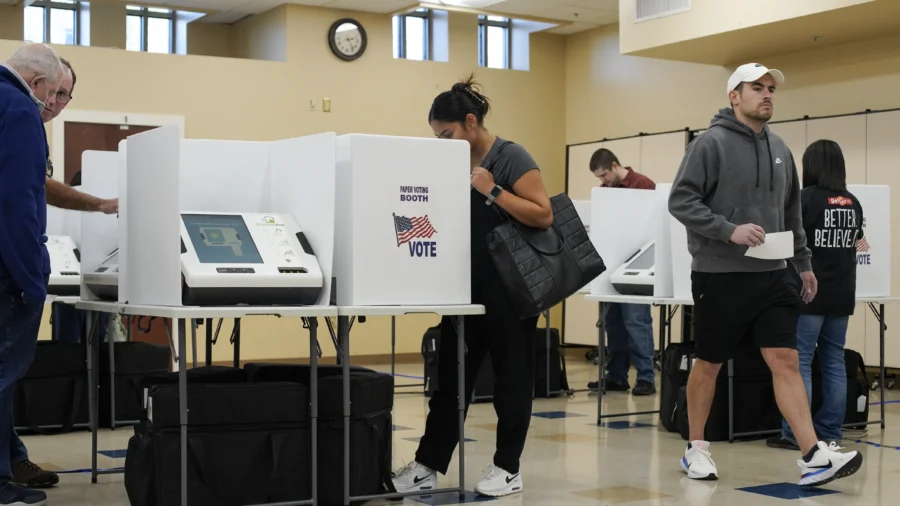A months-long push to cement abortion as a right in Ohio’s constitution prevailed on Nov. 7 as voters turned out to weigh in on the controversial ballot measure.
Issue 1 was the only abortion-related question on the ballot nationwide this Election Day, drawing the eyes—and funds—of abortion and pro-life activists around the country.
At the time the Associated Press called the race, the yes vote on the measure was leading 57-42 percent. Many expect the results to foreshadow the outcomes of similar ballot initiatives planned for other states next year.
Early turnout in the election exceeded that of the state’s special election in August, with more than 860,000 people casting their ballots prior to Election Day.
That was also likely due in part to Issue 2, a citizen-led initiative to legalize marijuana purchases, sales, and, for adults aged 21 and older, possession.
At the time of reporting, the yes vote on that measure was leading 55-44 percent.
Debate
The newly-passed constitutional amendment establishes that “every individual has a right to make and carry out one’s own reproductive decisions, including but not limited to decisions on contraception, fertility treatment, continuing one’s own pregnancy, miscarriage care, and abortion.”
Opponents of the measure objected to its broad language, noting that it applied to “every individual,” not just women or adults.
And although the amendment included a provision stating that abortion “may be prohibited after fetal viability,” it barred such a restriction in cases where the mother’s treating physician decides that the procedure is “necessary to protect the patient’s life or health.”
The treating physician, detractors noted, would be the same doctor paid to perform the abortion.
Other concerns voters raised included the possibility that the new law could be interpreted to include a right for children to undergo sex-altering procedures and that it would nullify an existing state law requiring parental consent for abortions performed on minors.
“Issue 1 on the ballot goes far beyond reasonableness,” northeastern Ohio resident and independent voter Joanne Arnett told The Epoch Times before voting against the measure.
“I cringe to imagine putting doctors and nurses in the situation to kill a fully formed child right before birth,” she said. “I cringe to imagine a 30-year who was convinced as a child by teachers and psychologists to undergo removal and mutilation of their sex organs and put them on hormone blockers and then have the realization years later of the damage that was done to them.”
But Mathis Kleckley, a Christian bus driver from Reynoldsburg, said he voted yes on Issue 1 because he believes that God gives people choices, and that others should not have the ability to “play God” and take them away.
“We don’t want the government playing God either,” he said.
Other proponents have pushed back on claims that Issue 1 would legalize abortion through birth or erase parents’ rights.
The measure, they held, would simply solidify protections for rights that have been challenged nationally since the U.S. Supreme Court overturned Roe v. Wade last year in its Dobbs v. Jackson ruling.
In Ohio, abortion is currently legal through 22 weeks gestation. A 2019 limit on abortions after a fetal heartbeat has been detected—usually at around six weeks—that has been on hold due to litigation will likely be rendered moot by Issue 1’s passage.
“Fundamental freedoms are fundamental freedoms, right?” Abhi Rahman, national communications director for the Democratic Legislative Campaign Committee, said on a Nov. 6 call with reporters.
“At the end of the day, people know what they’re voting for. People know the main part of it is to make sure that people in Ohio have access to reproductive health care,” he added. “And, you know, regardless of how broad it is, that’s the important part, really—putting things the way they were before Roe fell and before the Dobbs decision.”
Implications
Several other states have weighed in on abortion since the court’s June 2022 ruling with similar results.
Last year, voters in Kansas voted down a ballot referendum that aimed to establish that the state’s constitution did not guarantee a right to abortion. A similar measure in Kentucky met the same fate, while a referendum to increase protections for babies who survive abortion attempts was rejected in Montana.
As Ohio’s election results were announced, reactions from interested parties poured in from around the country.
For Melissa Ohden, founder and CEO of the Missouri-based Abortion Survivors Network, the outcome was disappointing, but not wholly discouraging.
“The Dobbs decision returned the question of abortion to the states, and the people of Ohio have cast their vote to amend their constitution,” she told The Epoch Times. “Despite this, I believe that the people of Ohio will take this opportunity to ensure every woman knows that abortion is not the only choice she has and will strive to provide solutions to the challenges women face when contemplating terminating their pregnancy.”
Meanwhile, for the pro-abortion Indivisible Project, the results were a reason for celebration.
“Tonight, we are elated by this pro-choice victory in Ohio and in awe of the voters and dedicated leaders on the ground who sent a clear message ahead of 2024: abortion access is non-negotiable,” Indivisible Project Managing Director Mari Urbina said in a statement.
“Despite the odds and the obstacles voters faced, this election demonstrates the enduring belief in reproductive freedom, and that will always be stronger than the well-funded attempts to subvert it,” she continued, adding that her organization was “taking notes” from how the Ohio results might foretell future initiatives in other states.
Next year, voters in Arizona, Florida, Missouri, and potentially South Dakota will be asked to sound off on their own abortion referendums.
But only time will tell if, as many expect, the outcome in Ohio will serve as a bellwether for those other initiatives.
The Associated Press contributed to this report.
From The Epoch Times

